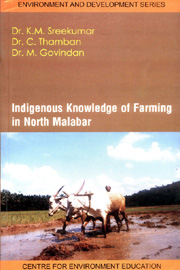Book contents
- Frontmatter
- Contents
- Foreword
- Preface
- Acknowledgements
- List of Photographs and Illustrations
- List of Tables
- List of Plants
- 1 Introduction
- 2 Agricultural Scenario in North Malabar
- 3 Farming Related Rituals
- 4 Rice
- 5 Coconut
- 6 Arecanut
- 7 Black Pepper
- 8 Cashew
- 9 Fruit Crops
- 10 Wild Fruits
- 11 Rubber
- 12 Spices
- 13 Tuber Crops
- 14 Vegetable Crops
- 15 Natural Resource Management
- 16 Indigenous Farm Implements
- 17 Miscellaneous Practices
- 18 Conclusion
- References
- Annexure I
- Annexure II
1 - Introduction
Published online by Cambridge University Press: 05 November 2011
- Frontmatter
- Contents
- Foreword
- Preface
- Acknowledgements
- List of Photographs and Illustrations
- List of Tables
- List of Plants
- 1 Introduction
- 2 Agricultural Scenario in North Malabar
- 3 Farming Related Rituals
- 4 Rice
- 5 Coconut
- 6 Arecanut
- 7 Black Pepper
- 8 Cashew
- 9 Fruit Crops
- 10 Wild Fruits
- 11 Rubber
- 12 Spices
- 13 Tuber Crops
- 14 Vegetable Crops
- 15 Natural Resource Management
- 16 Indigenous Farm Implements
- 17 Miscellaneous Practices
- 18 Conclusion
- References
- Annexure I
- Annexure II
Summary
“When a knowledgeable old person dies, a whole library disappears”
– African proverbFarmers have always experimented with applying locally adapted technologies, practices, crops, and livestock to optimise resource use, and improve production. Man has known the practices of processing even before the advent of modern science. While the modern highly-systematised research hypotheses were not applied to the extent they are applied today, definite goals were kept in mind by the farmers around the world in experimenting with new ideas, and the knowledge gained by trial and error was used to overcome difficult situations.
This valuable information, gained over a period of time, was passed on from generation to generation, mainly by word of mouth. This traditional knowledge is known as local knowledge, Indigenous Technical Knowledge (ITK), indigenous wisdom or simply as indigenous knowledge.
Indigenous knowledge is dynamic, and evolves through indigenous creativity and innovation, and through contact with other knowledge systems. Indigenous knowledge includes both technical and non-technical fields covering various social and religious taboos, belief and customs, communication patterns, music, ecology, vegetation, climate, and so on.
Indigenous knowledge may also be defined as the sum total of knowledge and practices that are based on people's accumulated experience in dealing with situations and problems in various aspects of life. Such knowledge and practices are usually unique to a particular culture.
Indigenous knowledge should not be considered as primitive, being left over from the past.
- Type
- Chapter
- Information
- Indigenous Knowledge of Farming in North Malabar , pp. 1 - 3Publisher: Foundation BooksPrint publication year: 2006



